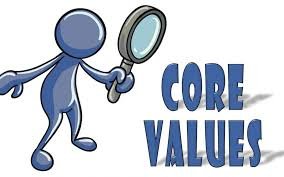A big part of defining your leadership brand is starting with your values. Values represent what we consider important and meaningful; they energize, motivate, and inspire us to lead authentically. Gandhi famously said, “Happiness is when what you think, what you say, and what you do are in harmony.” Yet, many of us move through life without a clear understanding of our values, often prioritizing others’ expectations over our own beliefs. Knowing your values—whether love, growth, money, integrity, or impact—gives you a foundation for leading in alignment with what matters most.
The Benefits of Knowing Your Values
· Clarity in Decision-Making. Values provide a guiding framework for choices, helping us navigate difficult decisions with ease. When we’re faced with uncertainty, our values act as a source of strength, keeping us grounded and aligned.
· Authenticity and Reduced Stress. Living in alignment with your values means less internal conflict and more stability. By operating from a place of authenticity, we reduce stress, as our actions consistently reflect who we truly are.
· Building Your Leadership Identity. Values shape our leadership identity, also known as our “personal brand.” Virtually every decision, from career moves to daily interactions, is influenced by our values. When we live by them, we strengthen our sense of self and create a leadership presence that’s impactful and reliable.
Identifying Your Core Values
1. Reflect on Personal Values. Start by examining a list of values. Highlight five that resonate with you personally—these might be empathy, integrity, courage, family, loyalty, etc.. For example, if you value empathy, consider how you demonstrate it in your personal life, such as actively listening to family members or friends. Some values may overlap with your professional life, but others may be unique to personal interactions.
2. Define the Importance of Each Value. Ask yourself why each value is meaningful. For instance, is empathy important because it allows you to connect deeply with others, or is it a value passed down from family? Reflecting on why you hold these values helps clarify whether they truly resonate or if they stem from past influences.
3. Assess and Align with Your Values. Once you’ve identified your values, assess how aligned you are in practicing them. Are there any values that you aren’t actively living? Addressing misalignment can relieve inner conflict, bringing greater peace and fulfillment.
Finding and Practicing Your Leadership Values. Just as with personal values, identifying your leadership values enhances your effectiveness and impact:
1. Identify Key Leadership Values. Review the values that you consider crucial in a professional setting. These might include teamwork, innovation, accountability, or resilience. Think about how these values guide your interactions and decisions with your team.
2: Articulate the “Why” Behind Your Leadership Values. For each value, reflect on how it shapes your leadership. Why is accountability important to you? Perhaps it fosters trust within your team or encourages transparency. Understanding the “why” solidifies your commitment to these values and makes it easier to communicate them to your team.
3. Examine Alignment with Your Leadership Style. Evaluate how well you’re embodying your values in your current role. If you value transparency, are you consistently open in your communications? If teamwork is essential, do you foster collaboration actively? Focusing on gaps between your values and actions creates growth and alignment opportunities.
Your leadership brand reflects your values, guiding your actions and setting an example for those you lead. Defining and aligning with your values isn’t a one-time task; it’s an ongoing commitment to leading with integrity, purpose, and authenticity.
Question. What values do you want to be known for in your leadership, and how can you begin embodying them more fully today? Comment and share below; we’d love to hear from you!
Quote of the day: “Your personal core values define who you are, and a company's core values ultimately define the company's character and brand. For individuals, character is destiny. For organizations, culture is destiny.” -Tony Hsieh
The next blog in this series 2/4 will focus on discovering your purpose.
As a leadership development and executive coach, I work with leaders to develop their leadership brand, contact me to explore this topic further.
Values Check - What are yours?

